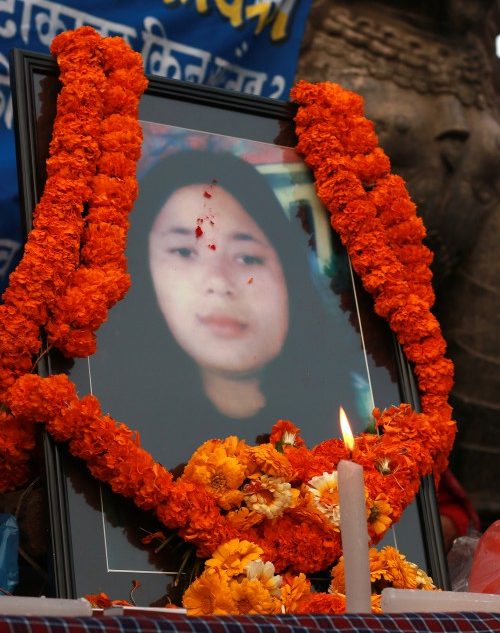
Nepal Found Responsible for the Extrajudicial Killing and Torture, Including Rape, of Girl During the Civil War, UN Human Rights Body Finds
Nepal has been found responsible for the extrajudicial killing and torture, including rape, of a 16-year-old girl during the Nepalese Civil War, the UN Human Rights Committee has found.
In a case that could have an impact in other cases of sexual violence during the conflict, the UN body found on 23 May 2022 several violations of the International Covenant on Civil and Political Rights (ICCPR), which Nepal ratified in 1991. The Committee considered a complaint filed by Advocacy Forum-Nepal and REDRESS on behalf of the victims’ parents, who found their daughter’s body in a cornfield in their village in 2004, after she was dragged from her home on the night of 13 February by around 20 uniformed, armed soldiers of the Royal Nepalese Army, who accused her of being a Maoist, which she denied.
Reena Rasaili’s body was discovered the next morning. Her blouse had been lifted up to her neck, her trousers pulled down to the mid-thigh, and there were scratches on her breasts. She was shot in the eye, the head and the chest.
Following complaints brought by her family, the National Human Rights Commission in Nepal found in 2005 that Reena was killed by security forces. In 2009, the Supreme Court upheld the Commission’s findings and ordered a prompt investigation. However, the main suspect was acquitted in 2013 due to lack of evidence and no-one has ever been held accountable for the violations suffered by Reena. After their repeated attempts of securing justice in Nepal were unsuccessful, her parents brought the case to the Committee.
In the official statement of the Human Rights Committee, Committee member Hélène Tigroudja, said:
“Nepal has failed to demonstrate how a 16-year-old unarmed girl posed any threat to a squad of twenty fully armed soldiers, much less justify how her rape and summary execution could serve any legitimate security aim. Such egregious crimes shall in all instances be timely and thoroughly investigated and their perpetrators, whoever they are, brought to justice and punished.”
The Committee found that Nepal was responsible for Reena’s arbitrary arrest; physical and mental torture, including rape; and execution. It also found that her rights not to be subjected to gender discrimination and to be protected as a child had been violated. The Committee criticised the lack of an effective remedy for her parents.
The Committee urged Nepal to conduct a thorough and effective investigation into Reena’s arbitrary detention, torture, including rape, and extrajudicial execution, and to hold those responsible accountable. It ordered a series of reparation measures, including the need for Nepal to provide rehabilitation to Reena’s parents, and to offer an apology and build a memorial for Reena.
The Committee also called once again on Nepal to align its statute of limitations for the crime of rape with international standards, as well as to impose sanctions and remedies for torture that are proportionate to the gravity of such crimes. The Committee considered that the 35-day statute of limitation that applied at the time to rape cases is incompatible with the ICCPR, and that even the reform of 2018 extending such statute to 180 days is incompatible with the gravity of the crimes in this case.
Upon learning of the Committee’s decision, Geeta Rasaili, sister of Reena, said:
“After we were denied justice in Nepal, we had filed the case at the UN Human Rights Committee. I feel that the decision of the Committee has opened the door for justice. I hope that the government will act promptly to implement the recommendations of the Committee and provide justice to my sister and our family. Only then the soul of my deceased sister will rest in peace.”
Om Prakash Sen Thakuri, Executive Director of Advocacy Forum-Nepal, stated:
“The Committee has given very important recommendations. But the biggest challenge in Nepal is non-implementation of court’s orders, and recommendations of National Human Rights Commission and United Nations treaty bodies. I hope that the government will promptly act to implement the views of the Committee and report withih 180 days explaining what measures were taken to implement the views in this case as well as in the past cases.”
Alejandra Vicente, Head of Law at REDRESS, said:
“How much longer must victims of sexual violence in Nepal wait for justice and reparation? Nepal’s failure to remove barriers to justice for victims more than 15 years after the conflict ended has contributed to the rampant impunity for perpetrators and marginalisation of victims. Nepal must amend its laws without delay to address the huge debt owed to victims of sexual violence, and to avoid the repetition of these events.”
For more information, please contact: Om Prakash Sen Thakuri, Director of Advocacy Forum-Nepal, on [email protected] or +977 9841275732 (English and Nepali) or Eva Sanchis, of REDRESS’ Head of Communications, on [email protected] or +44 (0) 7857110076 (English and Spanish).
Background information
See the official press release from the UN Human Rights Committee here and the full findings of the Committee here.
Photo of Reena Rasaili by Voices of Women Media
